The real cost of bottled water.
See how our bottleless water coolers compare.
Fill out this form or call 844-303-2841 to speak to a local Culligan Quench water expert. Fields marked * are required.
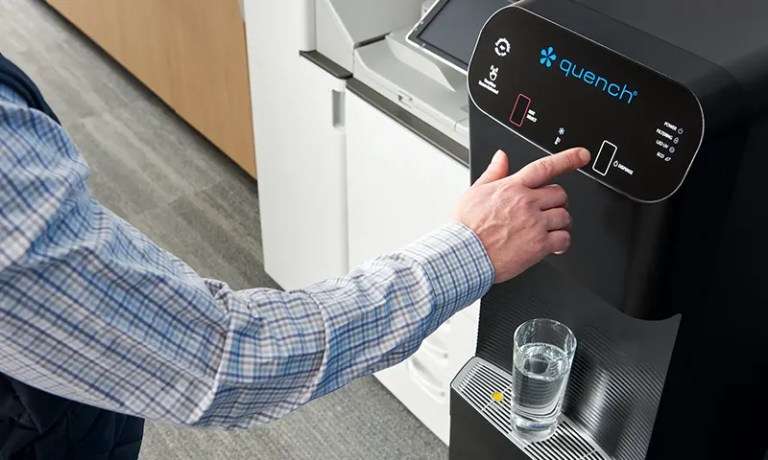
Take on-demand hydration to the next level. Culligan Quench bottleless water coolers and ice machines use advanced filtration and sanitization technologies such as carbon filtration and reverse osmosis to remove sediment, reduce lead and other chemical contaminants, and get rid of off-tastes and odors. By providing filtered water through a broad array of machines, our bottleless water coolers offer users countless consumption choices.
120,000+
customers
500+
service
technicians
80%
cost savings vs
bottled water delivery
1B+
bottles saved
per year
Offer a more sustainable solution for cleaner, better-tasting water on demand.
Fast, efficient, and reliable ice and water machines with advanced filtration.
Bottomless bubbles with built-in filtration for your modern workplace.
Better water makes better coffee. Give your people great-tasting coffee from best-in-class brewers.
Talk to an Chicago Culligan Quench water expert to find the best water solution for your space.
See how our bottleless water coolers compare.
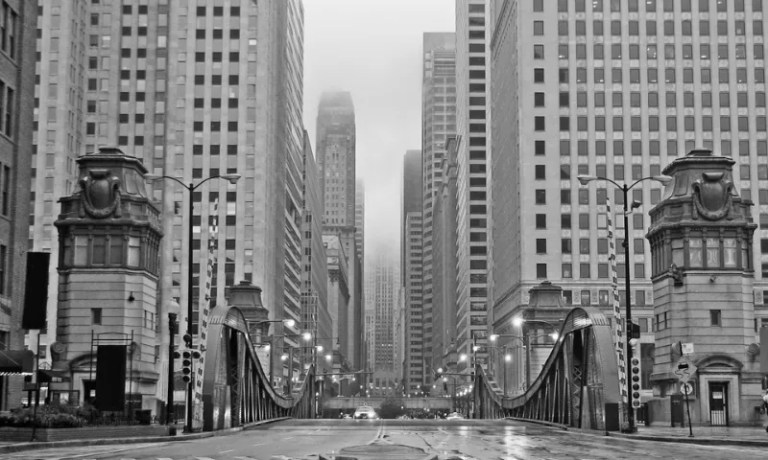
Chicago became a bustling metropolis during the Industrial Revolution, attracting workers from far and wide to the Midwest. But a growing population would soon lead to industrial, animal, and human waste polluting the surrounding Chicago River and Lake Michigan. By the 1850s (and after several cholera epidemics), city planners recognized the critical need to create a reliable source of clean Chicago drinking water.
Originally, waste discharged into the Chicago River found its way into Lake Michigan, carried by heavy rain or melting snow. The construction of four channels, including the 28-mile Sanitary and Ship Canal, reversed the flow of waste to carry sewage away from Lake Michigan.
In 1861, the Chicago Board of Public Works began construction of an extensive water system that remains in use today. A two mile tunnel excavated under Lake Michigan allowed clean water intake protected by a “crib” – a structure that surrounds the intake shaft from possible pollutants. Engineers and miners toiled 24 hours a day, 6 days a week to finish the construction of the Two Mile Crib within a year. Six additional cribs were added over the next 50 years: Carter H. Harrison, Edward F. Dunne, Wilson Avenue, and William E. Dever.
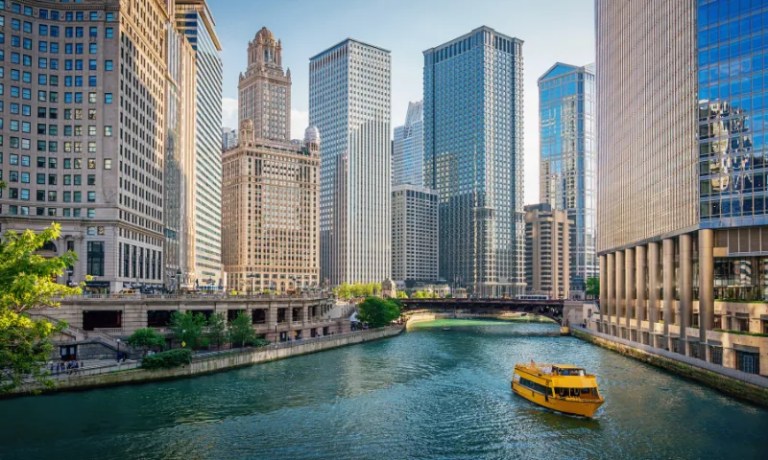
Today, Lake Michigan provides almost one billion gallons of water to local residents of Chicago and 125 surrounding communities. Many of the original cribs and pipes remain in use. These old, cast iron water pipes may crack, rust, and corrode, exposing drinking water to a number of potential impurities, like cloudiness, brown water, off-tastes, and odors. Although Chicago water quality continues to exceed state and federal requirements, a Chicago Tribune analysis recently discovered that Chicago tap water may contain lead contamination due to service lines made of the toxic metal.
Over 120,000 companies, big and small, trust Culligan Quench for cleaner, safer, and great-tasting water.
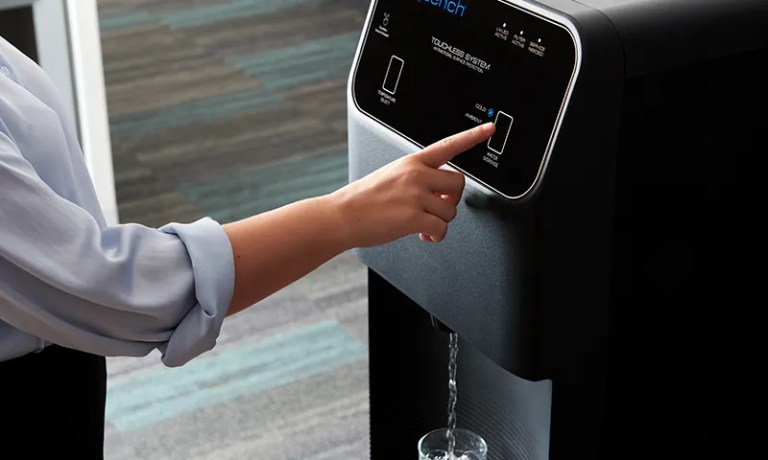
Worried about contaminants in your drinking water? We offer a full complement of water filtration and sanitization technologies to remove sediment, reduce chemical contaminants, including lead, and get rid of off-tastes and odors. Depending on your local water quality, your Water Expert may recommend our NSF-certified carbon filtration, which works great for water with TDS (total dissolved solids) levels under 250 ppm (parts per million) or our NSF-certified reverse osmosis (RO) filtration, which is the standard for water with TDS levels over 250ppm.
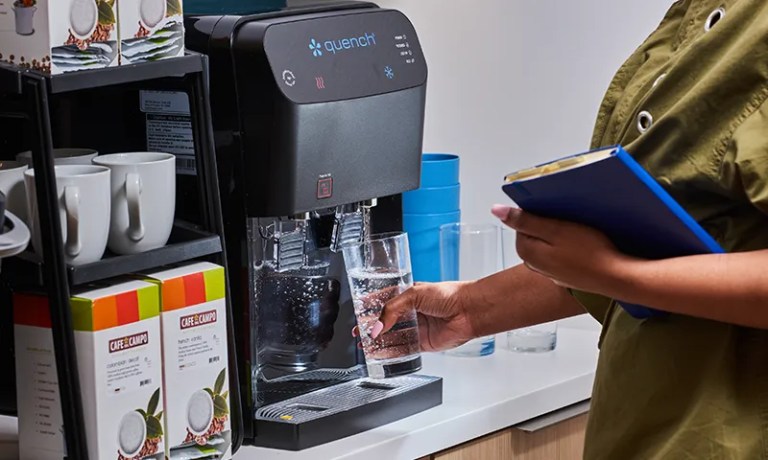
By creating a customized water filtration solution and tailoring your installation and service needs for your business, we can guarantee that Culligan Quench office water coolers produce crisp, clean, great-tasting water – and at a fraction of the price of bottled water delivery services. Go bottle free with Culligan Quench and you will save time, money, and the environment, plus you will have better tasting and safer drinking water!
Backed by 85 years of Culligan expertise, Culligan Quench has focused exclusively on providing businesses with the highest quality filtered water. This commitment to doing one thing well has made us the trusted water authority for over 75% of the Fortune 500. We offer the best bottleless water coolers, ice machines, sparkling water dispensers, and coffee brewers to fit any workplace. No matter your location, company size, or industry, we have a filtered water solution that is right for you
Play videoYes, Chicago tap water is safe to drink and meets all U.S. EPA and Illinois EPA water quality standards. The City of Chicago Department of Water Management conducts more than 600,000 water quality tests annually, ensuring compliance with federal safety guidelines.
However, in older commercial buildings—especially those built before the 1986 lead pipe ban—tap water may be affected by outdated plumbing systems. Many offices and facilities choose to install filtered water stations or bottleless dispensers as a precaution and to improve taste.
Regular internal water testing is recommended for office complexes, restaurants, healthcare settings, and multi-tenant commercial spaces.
Yes, Chicago has moderately hard water, averaging around 130–180 parts per million (ppm) of calcium and magnesium. This can cause mineral buildup in commercial plumbing systems and appliances over time.
For businesses, this means:
Installing a commercial-grade water softening system can help reduce scale buildup, extend equipment life, and lower operating costs.
Yes, Chicago’s municipal water is safe to drink at the source, treated at two of the largest purification plants in the U.S. — the Jardine and Sawyer Water Purification Plants. The water consistently meets or exceeds federal and state standards.
That said, internal plumbing systems within older buildings may pose risks, particularly due to lead service lines still in place in parts of the city. Business owners should consider point-of-use filtration or third-party water testing if their building infrastructure is aging or hasn’t been recently upgraded.
Chicago water is classified as moderately hard, due to naturally occurring minerals like calcium and magnesium drawn from Lake Michigan. While the hardness level is not extreme, it can still cause scaling in commercial plumbing and equipment over time.
Soft water alternatives are especially beneficial for:
A tailored water treatment solution can help reduce maintenance costs and support sustainability efforts in commercial buildings.
Yes, trace levels of PFAS (per- and polyfluoroalkyl substances) have been detected in Chicago water, but current levels remain below federal advisory limits. The city is monitoring PFAS closely, and Illinois has proposed additional regulations to control and eventually reduce these emerging contaminants.
For businesses prioritizing environmental health or working in sensitive industries like healthcare, education, or childcare, installing NSF-certified PFAS filters can offer extra protection and peace of mind.
Stay informed by reviewing the City of Chicago’s annual water quality report and consider a proactive filtration strategy to meet rising environmental standards.
Proudly providing businesses with clean, filtered drinking water in the greater Chicago Metro Area, including Cook County, DuPage County, Kane County, Kendall County, Lake County, McHenry County, and Will County.
| Mon: | 8 AM – 8PM |
| Tues: | 8 AM – 8PM |
| Wed: | 8 AM – 8PM |
| Thur: | 8 AM – 8PM |
| Fri: | 8 AM – 8PM |
| Sat: | Closed |
| Sun: | Closed |
Ready to upgrade
your water?Get matched with the best water, ice, sparkling water or coffee machine for your workplace.
Take our quiz